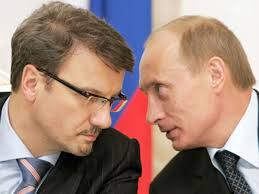
Vladimir Putin rarely acts as an advertising agent, but the current economic crisis and the fear of political instability it provokes are forcing the president to recur to unorthodox methods of state support for key segments of business on which the regime’s financials are based. During his meeting with the head of Sberbank—Russia’s major bank, 51 percent of which is owned by the state—Putin suggested that Russian citizens should take out mortgages without waiting for interest rates to go down.
There could be many reasons for such promotional activity, the chief among them being a slowdown in nominal wage growth, an upturn in inflation since July, and a rise in the unemployment rate. These factors are already affecting the banking sector and could potentially lead to a balance-of-payments crisis, the holding back of wages and pensions, and other systemic problems. Analyzing Putin’s aforementioned statement, Russian economist Sergei Aleksashenko notes that while the numbers of mortgage loans have been increasing, their amounts have been steadily diminishing.
As of the summer of 2016, the growth of Russia’s mortgage market has been mostly caused by measures of state support, the repeal of which, according to the Russian Finance Ministry, will inevitably lead to an increase in mortgage rates and a lower demand for mortgage loans. Essentially, Sberbank is the only bank that shows decent mortgage figures, whereas such key players in the Russian banking sector as VTB24, Gazprombank and Rosselkhozbank, not to mention smaller banks, demonstrate an almost two-fold decrease in the volume of mortgage loans. According to experts, the present surge in demand for housing caused by slumping prices will not last, first of all because Russians are running out of savings, and the structure of consumer demand has changed toward bare necessities.
This is due in no small part to the volume of household credits. Research conducted by the United Credit Bureau has shown that 59 percent of Russia’s economically active citizens have credit debts, and an average borrower owns a bank around 210,000 rubles (US$3,260 at the current exchange rate). With average monthly wages amounting to 38,000 rubles (US$590) and gradually shrinking—Russians’ incomes have been declining for the last 20 months—even this average debt makes it unlikely that the borrower will be granted additional loans.
Data from the Russian Central Bank also confirm this: the growth in the number of loans to individuals has been slowing down since the beginning of 2016, and has turned negative after the first six months of the year. The past-due debts on individual loans remain high (81.3 billion rubles,) and have already more than doubled from January 1, 2015, when they amounted to 35.8 billion rubles. The volume of assets of the largest banks is also decreasing: in the first six months of 2016 they have fallen by 1 trillion rubles (US$15.5 billion,) with most losses occurring in the second quarter of 2016.
Micro-financing institutions are demonstrating different tendencies: the volume of micro-credits is growing, as is the number of such institutions. The reason for the growth in this segment is simple: more and more Russians need short-term payday loans.

All these circumstances point to the fact that the Kremlin’s desire to take away citizens’ remaining savings, investing them in new residential real estate and providing banks with a stable interest income, is the real reason behind the Russian president’s advertising campaign in support of mortgages. Those who are employed will work even more to pay the interest and provide themselves and their children with higher living standards, and not pay attention to politics. The Kremlin’s propaganda machine has already thoroughly brainwashed Russian citizens in terms of identifying their internal and external enemies, and can now afford to focus on taking away money from the besotted population and on enslaving it financially.





